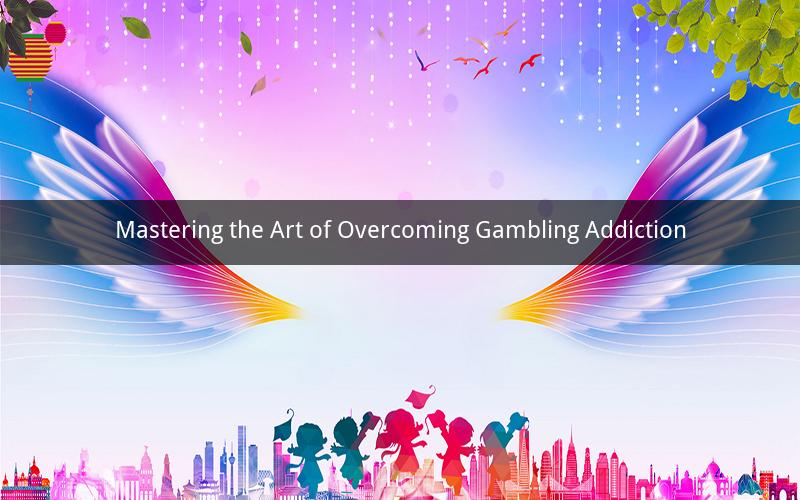
1. Understanding the Problem
Gambling addiction, often referred to as a behavioral disorder, is a significant concern affecting millions worldwide. It is a complex condition characterized by the inability to control or stop gambling, despite adverse consequences. In this article, we will explore various strategies and techniques to help you control your gambling addiction.
2. Identifying the Causes
To combat gambling addiction, it's essential to first understand its causes. Common triggers include:
a. Emotional issues: Individuals may turn to gambling as a coping mechanism for anxiety, depression, or other emotional problems.
b. Peer pressure: Being surrounded by individuals who gamble can influence one to develop a similar habit.
c. Financial difficulties: Gamblers may resort to betting as a means of escaping debt or financial stress.
d. Media exposure: Frequent exposure to gambling-related content can spark interest in this activity.
3. Seek Professional Help
Professional guidance is crucial when dealing with gambling addiction. Here are some ways to get the help you need:
a. Therapy: A therapist can help you uncover the underlying issues driving your gambling addiction and develop strategies to overcome them.
b. Support groups: Joining a support group allows you to connect with others facing similar challenges, offering empathy, understanding, and advice.
c. Treatment programs: Various treatment programs, both inpatient and outpatient, can help you overcome your addiction by providing a structured environment and tools to resist temptation.
4. Create a Support Network
A robust support network is vital in the journey to controlling gambling addiction. This network may include:
a. Friends and family: Openly communicate with those you trust and ask them to hold you accountable.
b. Co-workers: Seek their understanding and support in your quest to overcome addiction.
c. Online communities: Join online forums or chat rooms to connect with others struggling with similar issues.
5. Develop Coping Skills
Learning effective coping skills can help you deal with cravings and the urge to gamble. Some techniques include:
a. Relaxation techniques: Engaging in activities such as yoga, meditation, or deep-breathing exercises can help calm your mind and reduce stress.
b. Distraction methods: Find healthy ways to distract yourself when feeling the urge to gamble, such as exercising, reading, or engaging in hobbies.
c. Rewarding positive behavior: Reward yourself for refraining from gambling and reaching milestones in your recovery process.
6. Monitor Your Finances
Financial stability is essential in overcoming gambling addiction. Here are some tips to manage your finances:
a. Budgeting: Create a realistic budget to help you manage your expenses and avoid falling into debt.
b. Tracking spending: Keep a record of your financial transactions to identify patterns and areas for improvement.
c. Cutting off sources of funding: If possible, remove your access to credit cards and borrowing options to minimize financial risks.
7. Stay Focused on Your Goals
Remaining committed to your recovery goals is essential for long-term success. Here are some ways to stay motivated:
a. Set specific goals: Break your overall goal into smaller, achievable goals to keep you on track.
b. Reflect on progress: Regularly review your progress to stay motivated and recognize the achievements.
c. Adjust goals as needed: Be open to revising your goals based on your progress and feedback from others.
8. Take Responsibility for Your Actions
Acknowledging and taking responsibility for your actions is crucial in overcoming gambling addiction. Here are some tips:
a. Apologize for harm caused: If your addiction has hurt loved ones, make amends where possible.
b. Accept responsibility for mistakes: Acknowledge your errors and learn from them.
c. Focus on positive change: Redirect your energy towards improving yourself and your relationships.
9. Learn from Mistakes
Mistakes are an integral part of the recovery process. Instead of dwelling on them, use them as an opportunity to learn and grow:
a. Analyze mistakes: Understand why they occurred and what could be done differently in the future.
b. Practice forgiveness: Forgive yourself and others for past mistakes to move forward.
c. Move forward: Use your mistakes as a stepping stone to better decisions and actions.
10. Embrace Lifelong Recovery
Finally, understand that overcoming gambling addiction is a lifelong process. Stay committed to your recovery journey by:
a. Remaining vigilant: Be aware of potential triggers and seek help if you feel overwhelmed.
b. Continuing education: Stay informed about gambling addiction and its treatment methods.
c. Practicing self-care: Take care of your physical, mental, and emotional well-being to maintain your progress.
Questions and Answers:
1. Q: What are some immediate steps I can take to control my gambling addiction?
A: Seek professional help, such as therapy or a support group, create a support network, develop coping skills, and monitor your finances.
2. Q: Can gambling addiction affect my relationships?
A: Yes, gambling addiction can significantly impact your relationships with friends, family, and co-workers. It is crucial to address this aspect of your life and work on rebuilding trust.
3. Q: Are there any natural remedies to overcome gambling addiction?
A: While there is no magic cure, some natural remedies like relaxation techniques and exercise can help manage stress and reduce cravings.
4. Q: Can I recover from gambling addiction on my own?
A: It's possible, but professional help, support from others, and a strong commitment to recovery are often more effective.
5. Q: What can I do if my loved one has a gambling addiction?
A: Encourage them to seek help, offer your support, and join a support group for family and friends affected by gambling addiction. Educate yourself about the issue to better understand and assist your loved one.